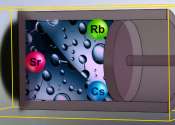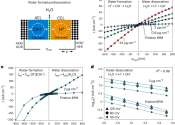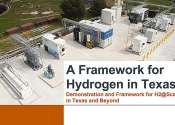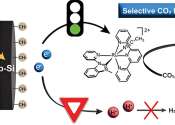Hydrogen (pronounced /ˈhaɪdrədʒən/) is the chemical element with atomic number 1. It is represented by the symbol H. At standard temperature and pressure, hydrogen is a colorless, odorless, nonmetallic, tasteless, highly flammable diatomic gas with the molecular formula H2. With an atomic weight of 1.00794 u, hydrogen is the lightest element.
Hydrogen is the most abundant chemical element, constituting roughly 75% of the universe's elemental mass. Stars in the main sequence are mainly composed of hydrogen in its plasma state. Elemental hydrogen is relatively rare on Earth. Industrial production is from hydrocarbons such as methane with most being used "captively" at the production site. The two largest uses are in fossil fuel processing (e.g., hydrocracking) and ammonia production mostly for the fertilizer market. Hydrogen may be produced from water by electrolysis at substantially greater cost than production from natural gas.
The most common isotope of hydrogen is protium (name rarely used, symbol H) with a single proton and no neutrons. In ionic compounds it can take a negative charge (an anion known as a hydride and written as H−), or as a positively-charged species H+. The latter cation is written as though composed of a bare proton, but in reality, hydrogen cations in ionic compounds always occur as more complex species. Hydrogen forms compounds with most elements and is present in water and most organic compounds. It plays a particularly important role in acid-base chemistry with many reactions exchanging protons between soluble molecules. As the only neutral atom with an analytic solution to the Schrödinger equation, the study of the energetics and bonding of the hydrogen atom played a key role in the development of quantum mechanics.
Hydrogen is important in metallurgy as it can embrittle many metals, complicating the design of pipelines and storage tanks. Hydrogen is highly soluble in many rare earth and transition metals and is soluble in both nanocrystalline and amorphous metals. Hydrogen solubility in metals is influenced by local distortions or impurities in the crystal lattice.









